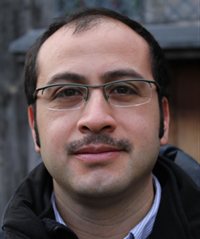
'Our curriculum includes speakers from different areas of the subject; this means a range of points of view can be learnt for a specific topic.'
Guido Martínez
Why did you choose to study at the University of Birmingham?
Firstly, I had been working on environmental health for more than 5 years in my country, for the Department of Environmental Health, Ministry of Health, Chile. I realized that the core curriculum of the Masters programme would be very useful to my professional life. Secondly, it was possible to contact the Master lecturers before the start of the course. In my personal case I contacted the programme leader of the Masters before I started and all my questions were answered quickly and properly. Thirdly, the University offer the chance to improve your level of English before starting your course.
The “Presessional English Course” helps you understand academic life in England and to settle in Birmingham. Finally – and this is one of the most important things - British society has important human values in terms of the respect and tolerance of others. I am really pleased that the University of Birmingham gave me the opportunity to study here. At the same time I am really pleased to get my government scholarship (CONICYT) which allows me study and live here.
Where did you previously study? How does studying at Birmingham differ from where you have previously studied?
I studied my previous degree (Renewable Natural Resources Engineer) at the Universidad de Chile. I can say that the excellence level of the education is pretty similar at both universities. The University of Birmingham provides students with an excellent online platform. This platform contains direct access to an online library, previous lectures, directed reading and all the necessary elements to study the course properly. This platform is available 24/7 from the University or at home, meaning all academic resources such as scientific journals and eBooks are always available.
What makes your course at Birmingham stand out for you?
Academics encourage students to develop a critical and individual point of view about the real problems of environmental health. Assessments are designed to develop an individual point of view of the current environmental health problems too. Likewise, lecturers give us all the necessary tools to understand and solve problems. They also teach us how to obtain the necessary information from reliable and widely recognized sources.
How would you rate the facilities in the School, and can you give us a brief description of the facilities you’re using?
The University provides different study points around the campus. A recent E-learning centre was opened which has a large number of computers with full Internet access, printers and confortable study desks. At the same time the Barneys library has a comfortable lounge, printers, photocopiers and scanners, all of which are really useful in submitting essays and final assessments. At the same time, there are a range of facilities and services such as shops in which it is possible to find food, hot and cold beverages and fresh vegetables and fruits.
How do you find living in Birmingham?
Birmingham is a friendly and good environment to live. The people are friendly and tolerant, the most important thing in my point of view. The city offers a range of shopping and nice parks. At the same time you can visit other cities easily just by travelling on the amazing UK railway network.
How do you find the level of support you get from your lecturers?
The teachers of the Public and Environmental Health Masters have a high level of knowledge and experience. At the same time you can contact them at any time. Fortunately, our curriculum includes speakers from different areas of the subject; this means a range of points of view can be learnt for a specific topic. Additionally, the lecturers are from academic or government agencies, meaning they always teach us real case studies and how to enforce the knowledge and policies on real events.
Would you recommend Birmingham to other students?
Of course! It is a good academic environment.
What do you hope to go on to do in the future and what are your career plans?
I hope to continue working in my country, Chile. I hope to return soon and be able to apply everything I've learned. I am absolutely amazed at the great quantity of environmental and public health information which is available in the UK, I hope to support my country to generate similar information standards. Likewise, I am surprised with the many recent environmental policies in the UK. I hope to support my country with positive lessons learnt in the UK.